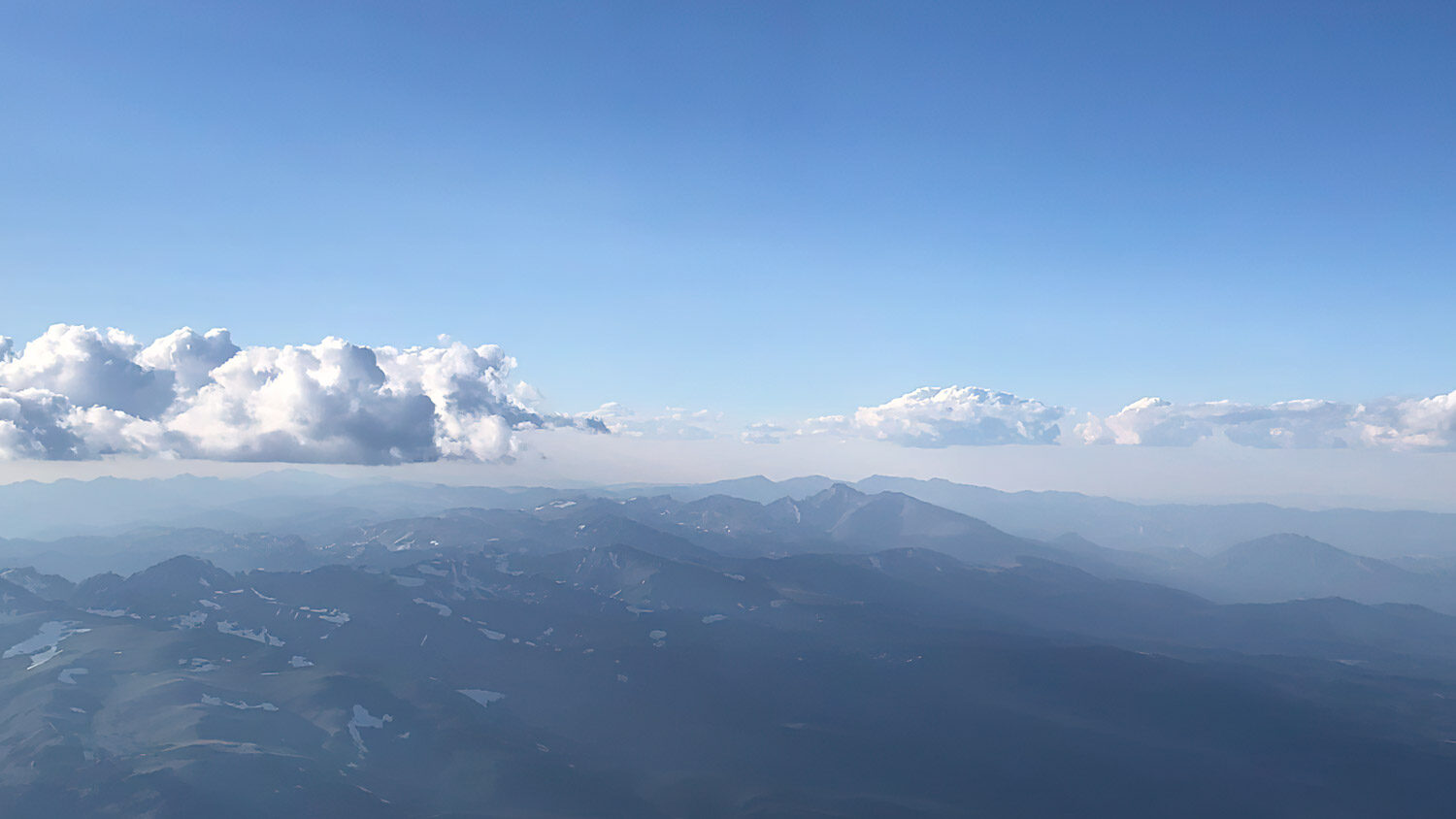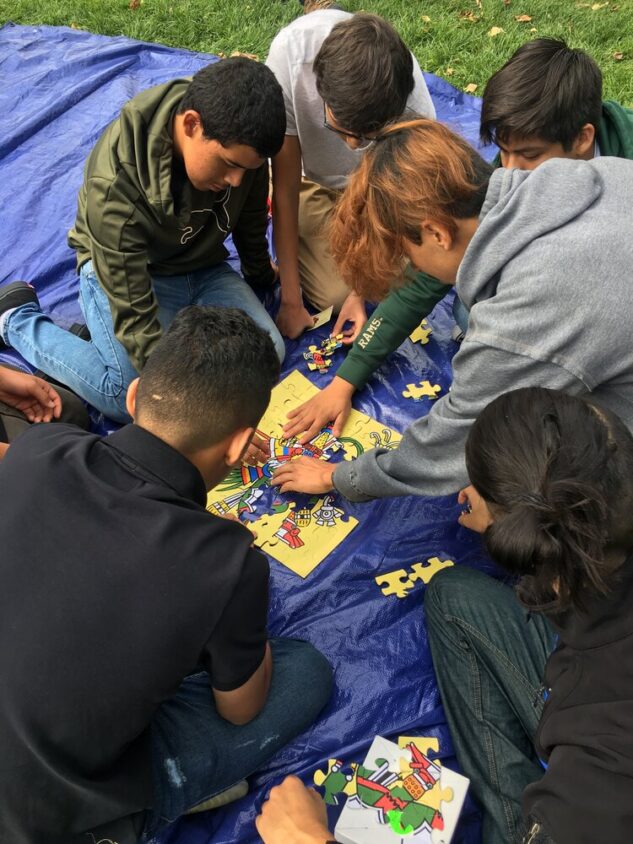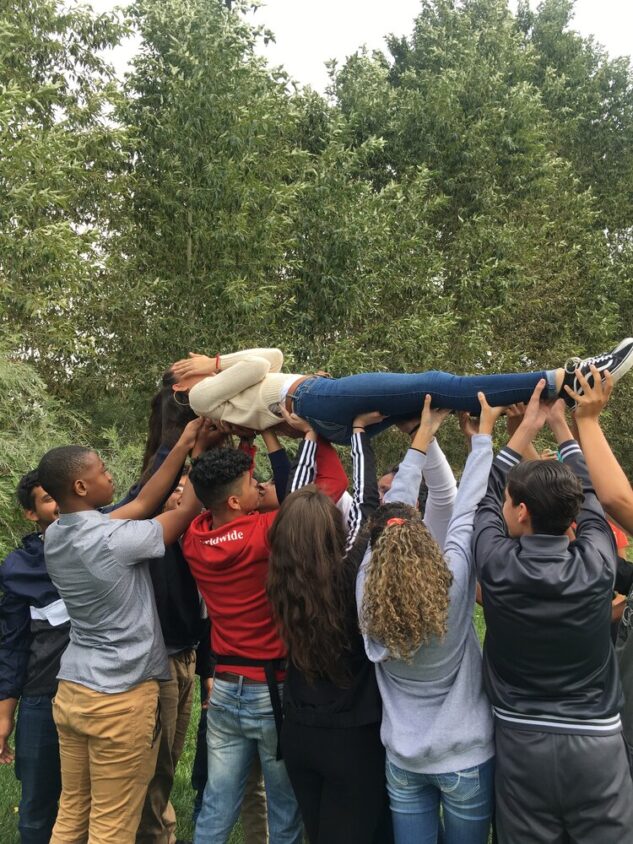Culturally Responsive School Design: Strive Prep-RISE, Denver

Strive Prep-RISE is a high school in Denver whose students have been featured in the news for their activism in the Black Lives Matter movement. In this piece which emerges from engagement with school founder Elisha Roberts as well as current and former students, we explore how the school’s design intentionally nurtured students who participate actively to improve their communities.
RISE was founded in 2016 year with a mission to challenge societal inequities and to help encourage young adults to be conscious humans. Student voice and choice is deeply embedded in their DNA, and each year the team (including students) iterates on what they’ve experienced and designed. This post also includes responses from students where they interrogate and elaborate on the founder’s story.
The Founder’s Story: Elisha Roberts’ Narration
At RISE we have developed five signature experiences to make our mission possible.
1. Portrait of a Phoenix
Our mascot is a phoenix, and students begin their journey at RISE through our Portrait of a Phoenix, the bird who rises again out of ashes. When we onboard our 9th graders, we spend the first week of school going into a deep dive on:
- Who they are (personal knowledge)
- The history of education system over the last century, with a particular focus on Black and Latino/a students (historical knowledge)
- How our students can insert themselves and their families into that narrative: How do you fit yourself into the timeline of the history of education in the last century: where has your family been, where are you now, and where do you want to go?
This last point takes personal knowledge and historical knowledge and brings them together so that our students have the opportunity to insert their and their families’ lived experiences into the society narrative that we call history. It enables them to understand that they are a part of history (and the present), the context and significance of their presence in time, and have a voice in shaping both
This onboarding experience also sets up our expectations for learning at RISE: students come to understand that they are at the center of learning, and the adults are going to ask them for your opinion and embrace their challenges.
2. Intersession

Intersession takes place for a week in January, the first week of second semester. Each year the staff chooses a social justice focus. Year 1 was mass incarceration, Y2 was immigration, Y3 environmental justice, and next year, Y4, will be gender studies. We run it like a conference, where you can choose the sessions that interest you, and present your specialized learning. Intersession week not only focuses on educating students about social justice issues occurring in their community, but also educates students on the different actions they can partake in to contribute to change.
- 3-4 people built the curriculum out for the rest of the staff
- Everyone has foundational lessons
- There’s a roster of guest speakers
- It concludes with presentations that focus on how you connect with the theme; you can choose to create these by yourself or with others.
We have found that this experience is, like our Portrait of a Phoenix, powerful in helping our students connect their lives with larger societal narratives. The statistics are out there: One in three Black men are incarcerated as are one in five Latino men. As students went deep on incarcerations, they were able to learn about this topic from an academic perspective and bring their own family stories to bear on that. Some of our students’ presentations were on family stories–this is my uncle or my father, while others gave overviews of criminal justice around the world. They could design the vantage that made the most impact on them at that moment.
Some of these sessions come from empathy interviews–we use them for everything from schedule, what should the starts and ends of days look like, what do you need to get through the day.
3. Life 101
Life 101 is a course that came out of the empathy interviews we do regularly with our students (thank you, Transcend). It’s 100% co-designed with our most recent graduating class.
- It begins with a scholar design team
- They created a course with their civics teacher that would give students civics and economics credit
- It focused on topics deeply relevant for recent high school graduates launching into the world
- How to manage a budget
- How to buy a car
- How to do your taxes
- How to select a health insurance plan
- How to be involved in their communities and what steps can be done to be get involved
These are things that schools don’t teach and more privileged students get from their families and networks. This student-designed course serves to address a powerful imbalance in daily life knowledge capital. It educates students on the different life-long skills they need.
4. College Tours
This signature experience is still in its infancy stage. We realize that travel is also part of the imbalance of knowledge capital. Our students travel but they go to visit family, not to acquire cultural knowledge. We began to address this by instituting college tours.
- Our entire 11th grade takes a trip to the University of New Mexico, a Hispanic-serving university
- On our way there from Denver, we also visit other colleges.
- This way EVERY student gets exposure to colleges and universities, as well as travel for a knowledge-gathering purpose
- We also invite selected students (based on their academic achievement) on East and West Coast trips to visit colleges in cities like Los Angeles, New York, Boston, and D.C.
- A good number of them enrolled in colleges on the coasts
5. Clubs

Another big equity issue in Denver is clubs. Students have access to one bus at the end of the day that can get them home, which means that if clubs happen after school, they need to find their own transportation back home. Also athletics happens after school, so if you’re an athlete and clubs are held after school, you have to choose between exploring your interests in sports and your interests more broadly. To solve for this we designed clubs into the school day. We have a double block during which students can both get tutoring (e.g in AP Government or Math) and participate in clubs (e.g. Soccer, K-pop, Manga, Dance, etc.). If students do not feel the selection of clubs features one of their passions or hobbies, they can also start their own club with the help of a teacher sponsor.
Every single one of these signature experiences, many of which were co-developed via student empathy interviews and our student design team, are intentionally built and iterated on to nurture grounded, activist students who will be conscious humans.
Students’ Stories
Melissa Boateng: Throughout all of my education, no school has educated me on social justice issues the way STRIVE RISE has. There are so many young adults going into the real world without being educated on the topics of environmental justice and gender studies. I was constantly pushed into taking leadership roles so that I can be the voice of my community. These past 4 years have opened my eyes to issues that directly impact my community. They taught me that my sister’s and my lives are based on statistics and learning. This only motivated me more into wanting to make more changes for the future of my community. I hope to lead more change in the future of our country and my parents’ home country.
Zail Acosta: If I was asked what I was expecting my high school experience to be like in the summer of 2016, my guess would not have been anywhere near what it truly was. The academics and material were the base for what would become the 4 years that shaped who I would become. Before RISE, my range of my social justice knowledge extended only as far as whatever became most trendy online. As I made my way through the various extracurriculars, events, and intersession weeks, I was able to understand how where I lived, who I lived around, who lived there before me, and so forth, affects the lives of my community members. While also completing the requirements for high school, I learned how much weight that in itself has for minority groups. And while my school’s charter network focuses on college-bound goals, RISE took it a step further by explaining why, for each of us as individuals, higher education is important WHILE still recognizing the ways in which getting there may be a challenge.. While RISE had every resource imaginable, each of our teachers pushed individuality and initiative among the student body through opportunities to start clubs, take leadership roles, and plan events. From every teacher, to admin, and staff member, RISE’s team felt personable, genuine, and empathic so that teachers became mentors, friends, and family to some. RISE made the past 4 years more than a time full of satisfied requirements. It was a transformative, emotional, and growth-filled time that will have everlasting effects on every student who ever attended.
Shania Brace: In my four years attending RISE, the opportunities that were given to me to expand my knowledge on social justice issues and basic life skills have prepared me to take charge of my future with confidence. Learning about different social justice issues happening in society made me become more open and have more empathy for the things that are happening around me. I feel that it is important to understand about the injustices that are happening around you because it gives you and others the opportunity to make change starting on a small scale. Having the opportunity to also have clubs during school allowed me to manage my time with sports and classwork, and also gave me a chance to explore more clubs and gain new experiences through them. Having that opportunity has allowed me to build more character and become more comfortable stepping out of my comfort zone.
Fernanda Bahena: My experience at RISE has been very different from what I imagined it to be. It was an experience that prepared us and future generations to be leaders in the real world. Being here at RISE gave me the opportunity to learn about issues like mass incarceration, immigration, and environmental justice; issues that not many people my age or older know about or have no voice on such issues. These topics are topics that still impact our world today. Getting educated about these issues for the four years that I have been at RISE has made me realize how this impacts minorities, people of color, and other communities.
Elisha Roberts was born and raised in Denver, graduated from East High School, was awarded the Daniels Fund Scholarship and attended Occidental College (studying abroad in Botswana), for undergraduate and Boston College for grad school. She worked in Far NorthEast Denver and founded STRIVE prep RISE. Elisha has a fiance and a daughter whom she cherishes.
Melissa Boatang is a recent graduate of STRIVE RISE High School and a freshman at the University of Houston majoring in Biomedical Engineering with a Pre-Med track.She is a first generation African American Woman with goals of becoming a surgeon along with a business owner in Ghana.
Zail Acosta is a recent graduate of STRIVE Prep – RISE and an incoming freshman at Colorado State University. He is a first generation Latino man with goals of having a career in media production and direction.
Shania Brace recently graduated from STRIVE RISE and is a freshman at Howard University. She is a biracial woman with goals of having a career in Astronomy and/or fashion.
Fernanda Bahena is a recent graduate of Strive RISE High School and a freshman at Regis University majoring in Biology with a Pre-Med Track. She is a first generation Latina woman with goals of becoming an obstetrician.
Transcend supports communities to create and spread extraordinary, equitable learning environments.

